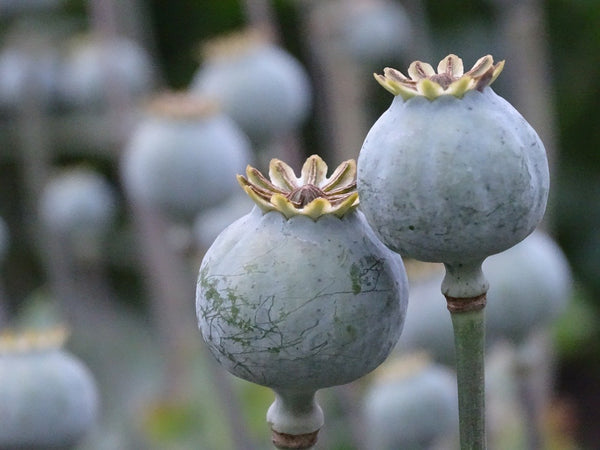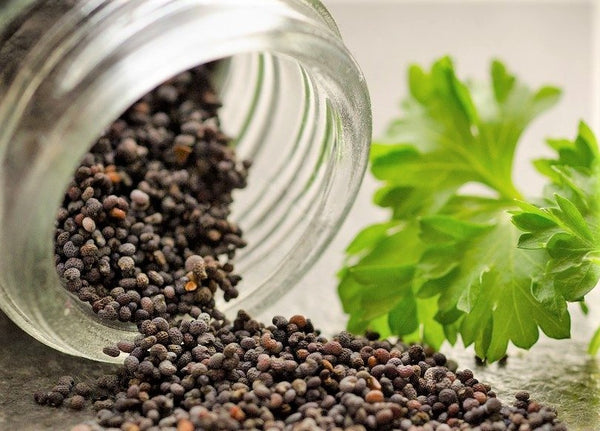Poppy seeds have been used for medicinal and culinary purposes around the world for thousands of years. They are popularly accompanied by lemon in baked goods, a nostalgic combination that has become a cult favorite throughout the US. These tiny seeds come from the inner pod of the vibrant poppy flower and boast incredible nutritional benefits that will have us all drizzling Lemon Poppy Seed Dressing on our salads every day.
ORIGINS

The first evidence of poppy seeds was found in the Mediterranean region, where they were being used as a mild sedative as far back as 2700 BC. Today, poppy seeds are used in baked goods and other culinary preparations all over the world, but all of the poppy seeds we use are grown in just 15 countries, with Turkey, Czechia, and Spain being the biggest producers. It takes more than one million seeds to make up a pound, and with 168 million pounds produced annually, that’s a whole lot of seeds!
FROM SEED TO SEED

Poppy seeds are harvested from the poppy flower. Each poppy plant produces several flowers, which burst open to reveal a bluish-green seed pod. Every plant has a large central pod (the “hen”) that is surrounded by dozens of smaller pods (the “chicks”). After all the flower petals have died and fallen off, the remaining bluish-green pods are dried for several days and cut open to reveal dozens of tiny bluish-black poppy seeds. Poppy fields can yield as many as 2,500 poppy seeds per square foot. If the pods are not harvested, they split and scatter their seeds several feet around the plant so that new poppy plants can grow the following season.
CULINARY USES
Poppy seeds can be used whole, ground, or pressed into oil. They are popular in baking in European, North American, and Middle Eastern cuisines. Jewish cuisine in particular has several pastry recipes that use poppy seeds in the fillings. Indian cuisine uses ground white poppy seeds to thicken and flavor traditional sauces and stews. In the US, poppy seeds are usually paired with lemon in sweet pastries like muffins and scones, but are also used in savory applications like salad dressings and bagel toppings. Because they pair so well with lemon, they also make for an interesting addition to simple pasta dishes with garlic, lemon, and herbs.
NUTRITIONAL BENEFITS

Not only are poppy seeds a versatile ingredient in cooking and baking, but they are also a nutritionally dense little seed. Poppy seeds are rich in fiber, essential omega-6 fatty acids, calcium, magnesium, manganese, phosphorus, thiamin, folate, and zinc. Used in higher doses, some studies suggest unwashed poppy seeds added to tea have eased anxiety and promoted sleep. We love them because they are tiny nutritional powerhouses that add a subtle nutty flavor and fun texture to our Lemon Poppy Seed Dressing.
FAQs About Poppy Seeds
Q. What are the benefits of poppy seeds?
Answer: Poppy seeds are a natural blood purifier and are loaded with iron, which helps to increase the red blood count in the body. By lowering inflammation and infections on the scalp, poppy seeds, a potent source of antioxidants and essential nutrients, support hair and scalp health.
Q. Are poppy seeds beneficial for the liver?
Answer: Poppy seeds have health benefits. Poppy seed oil, which contains omega-6 and omega-9 fats and has been associated with improved general health and a decreased risk of cardiovascular disease, can also be made by pressing poppy seeds.
Q. Can we eat khus khus (poppy seed) daily?
Answer: Poppy seeds are high in nutritional value. Approximately 100 grams of the seed have 18 grams of protein, 28 grams of carbohydrates, 20 grams of dietary fiber, and 3 grams of sugar in terms of nutritional value. When ingested in a healthy amount each day, the seeds regulate and preserve the body's overall health.
Q. What do poppy seeds look like?
Answer: The length of a poppy seed is much less than one millimeter. Numerous bakers utilize them in their breads, cakes, cookies, and other baked goods. They weigh little and are also referred to as Khas Khas in India. Consuming these seeds can have positive effects on your health.



